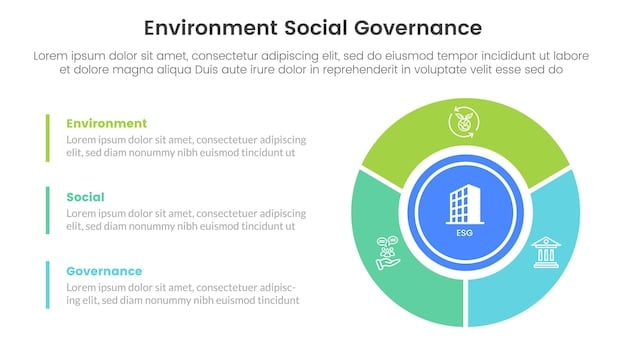Funding Smart City Initiatives: Grant Opportunities & PPPs in the US

Funding smart city initiatives in the US involves a mix of grant opportunities from federal and state sources, along with public-private partnerships (PPPs) that leverage private sector expertise and capital.
Funding smart city initiatives: Exploring grant opportunities and public-private partnerships in the US is crucial for developing technologically advanced, sustainable, and citizen-focused urban environments. These initiatives require significant investment, often sourced through a combination of public and private funding mechanisms. Understanding these options is vital for city planners and stakeholders.
Understanding the Landscape of Smart City Funding
Smart city initiatives are transforming urban environments across the United States, aiming to improve efficiency, sustainability, and the quality of life for residents. However, these ambitious projects require significant financial investment.
Navigating the complex landscape of funding options is crucial for cities looking to implement innovative technologies and infrastructure. This involves understanding various grant programs, public-private partnerships, and other financial strategies.

The Role of Federal and State Grants
Federal and state governments offer a variety of grant programs specifically designed to support smart city initiatives. These grants often target specific areas, such as transportation, energy efficiency, and public safety.
Securing these grants requires a thorough understanding of eligibility criteria, application processes, and reporting requirements.
- Federal Transportation Grants: Programs like the BUILD grant and INFRA grant can fund smart transportation systems.
- State Energy Efficiency Grants: Many states offer grants for projects that reduce energy consumption and promote renewable energy.
- Public Safety Grants: Grants from the Department of Justice can support smart policing and emergency response initiatives.
Public-private partnerships can be extremely valuable tools for city planners seeking to get more ambitious projects off the ground. Federal and state grants, combined with private investment, are key to success.
Exploring Federal Grant Opportunities for Smart Cities
The federal government is a significant source of funding for smart city projects, offering a range of grant programs across various agencies.
These grants often require a competitive application process, emphasizing innovation, community impact, and alignment with national priorities.
Key Federal Agencies and Programs
Several federal agencies play a crucial role in providing funding for smart city initiatives. Understanding their priorities and programs is essential for cities seeking financial support.
Navigating the federal grant landscape can be complex, but the potential rewards are substantial, enabling cities to implement transformative projects.
- Department of Transportation (DOT): The DOT offers grants for smart transportation systems, including connected vehicles, intelligent traffic management, and autonomous vehicle testing.
- Department of Energy (DOE): The DOE provides funding for energy-efficient buildings, smart grids, and renewable energy projects.
- Environmental Protection Agency (EPA): The EPA offers grants for projects that improve air and water quality, promote sustainable development, and enhance community resilience.

Federal grant opportunities often require applicants to demonstrate a clear plan for implementation, a strong partnership with community stakeholders, and a commitment to measuring and reporting on project outcomes.
Leveraging Public-Private Partnerships for Smart City Development
Public-private partnerships (PPPs) are becoming increasingly common in smart city development, offering a way to leverage private sector expertise, capital, and innovation.
These partnerships can take various forms, from design-build contracts to long-term concessions, allowing for a flexible approach to project delivery.
Benefits of Public-Private Partnerships
PPPs offer several advantages for smart city development, including risk sharing, access to specialized expertise, and faster project timelines.
However, successful PPPs require careful planning, clear contractual agreements, and a strong commitment from both public and private partners.
- Risk Sharing: PPPs allow public entities to share the financial and operational risks associated with smart city projects.
- Private Sector Expertise: Private companies often possess specialized expertise in technology, project management, and finance.
- Faster Project Timelines: PPPs can accelerate project delivery by streamlining procurement processes and leveraging private sector efficiencies.
Public-private partnerships can come with some challenges, so ensuring fair and transparent project plans are essential for a successful partnership.
Overcoming Challenges in Smart City Funding
Securing funding for smart city initiatives can be challenging, requiring cities to navigate complex bureaucratic processes, compete with other applicants, and address concerns about data privacy and security.
Addressing these challenges requires a proactive approach, including building strong relationships with funding agencies, developing compelling project proposals, and engaging with the community to address their concerns.
Strategies for Addressing Challenges
Several strategies can help cities overcome the challenges of securing funding for smart city initiatives.
By adopting these strategies, cities can increase their chances of securing the resources needed to build smarter, more sustainable, and more livable urban environments.
- Early Engagement with Funding Agencies: Building relationships with funding agencies and seeking feedback on project proposals can improve an applicant’s chances of success.
- Developing Compelling Project Proposals: Project proposals should clearly articulate the problem being addressed, the proposed solution, the expected outcomes, and the community impact.
- Addressing Data Privacy and Security Concerns: Cities should proactively address concerns about data privacy and security by implementing robust data governance policies and security protocols.
Data security and privacy are essential to developing successful projects. Ensuring transparency will give people comfort with new technologies.
Case Studies: Successful Smart City Funding Models
Examining successful smart city funding models from around the United States can provide valuable insights for cities seeking to implement their own initiatives.
These case studies highlight the importance of creativity, collaboration, and a strong commitment to community engagement.
Examples of Innovative Funding Approaches
Several cities have successfully implemented innovative funding approaches to support their smart city initiatives.
These examples demonstrate the potential for leveraging a combination of public and private resources to achieve ambitious smart city goals.
- Denver, Colorado: Denver has used a combination of federal grants, private investment, and user fees to fund its smart transportation initiatives.
- San Francisco, California: San Francisco has leveraged public-private partnerships to develop its connected streetlights and smart parking systems.
- Kansas City, Missouri: Kansas City has used a combination of tax increment financing and private investment to develop its downtown innovation district.
Understanding successful approaches is essential for ensuring new projects have the support they need to succeed.
The Future of Smart City Funding in the US
The future of smart city funding in the United States is likely to be shaped by several key trends, including the increasing importance of data analytics, the growing demand for sustainable solutions, and the rise of the sharing economy.
To remain competitive, cities will need to develop innovative funding models that leverage these trends and attract private sector investment.
Emerging Trends in Smart City Funding
Key trends are emerging in the landscape of smart city funding, creating new opportunities for cities to finance their initiatives.
By embracing these trends, cities can position themselves for success in the rapidly evolving world of smart city development.
- Data Analytics: Cities will increasingly use data analytics to demonstrate the value of smart city projects and attract investment.
- Sustainable Solutions: Funding agencies are increasingly prioritizing projects that promote sustainability and reduce environmental impact.
- The Sharing Economy: Cities can leverage the sharing economy to generate revenue and reduce costs associated with smart city infrastructure.
Smart city funding is changing, but remaining current on available options can help cities fund key initiatives in the future.
| Key Point | Brief Description |
|---|---|
| 💡 Federal Grants | DOT, DOE, and EPA offer grants for transportation, energy, and environmental projects. |
| 🤝 Public-Private Partnerships | PPPs leverage private sector expertise and capital for smart city initiatives. |
| 🛡️ Overcoming Challenges | Address challenges via engagement, strong proposals, and data privacy measures. |
| 🏙️ Future Trends | Data analytics, sustainability, and the sharing economy will shape future funding. |
Frequently Asked Questions
▼
Common sources include federal and state grants, public-private partnerships (PPPs), municipal bonds, and private investments. Grants are often project-specific, while PPPs leverage private sector expertise.
▼
PPPs facilitate risk sharing, bring in specialized expertise, and often speed up project completion. The private sector’s efficiency and innovation enhance public projects.
▼
Challenges include navigating complex application processes, competition for funds, and concerns about data privacy. Cities must proactively address these issues to succeed.
▼
Data analytics is increasingly vital for demonstrating project value and attracting investment. It helps cities show how projects improve efficiency and residents’ lives.
▼
Funding agencies prioritize projects promoting sustainability and reducing environmental impact. Cities should integrate sustainable practices to increase their chances of securing funds.
Conclusion
Funding smart city initiatives: Exploring grant opportunities and public-private partnerships in the US requires a multifaceted strategy that combines public and private resources. By understanding the available funding options, addressing potential challenges, and embracing innovative funding models, cities can build smarter, more sustainable, and more livable urban environments for their residents.





